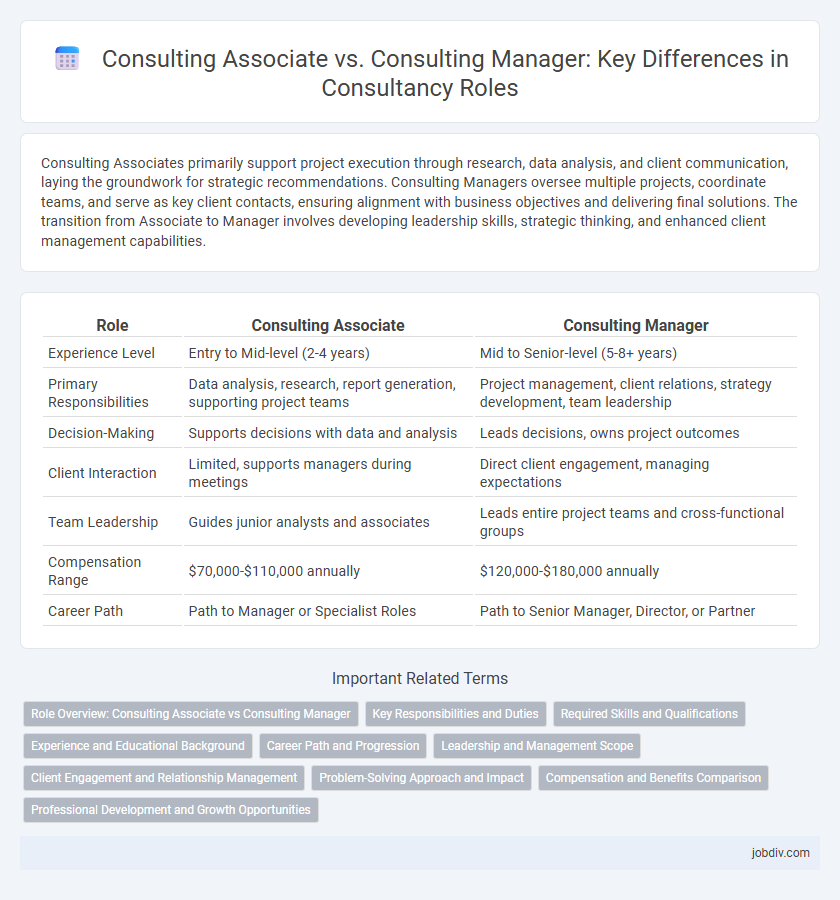Consulting Associates primarily support project execution through research, data analysis, and client communication, laying the groundwork for strategic recommendations. Consulting Managers oversee multiple projects, coordinate teams, and serve as key client contacts, ensuring alignment with business objectives and delivering final solutions. The transition from Associate to Manager involves developing leadership skills, strategic thinking, and enhanced client management capabilities.
Table of Comparison
| Role | Consulting Associate | Consulting Manager |
|---|---|---|
| Experience Level | Entry to Mid-level (2-4 years) | Mid to Senior-level (5-8+ years) |
| Primary Responsibilities | Data analysis, research, report generation, supporting project teams | Project management, client relations, strategy development, team leadership |
| Decision-Making | Supports decisions with data and analysis | Leads decisions, owns project outcomes |
| Client Interaction | Limited, supports managers during meetings | Direct client engagement, managing expectations |
| Team Leadership | Guides junior analysts and associates | Leads entire project teams and cross-functional groups |
| Compensation Range | $70,000-$110,000 annually | $120,000-$180,000 annually |
| Career Path | Path to Manager or Specialist Roles | Path to Senior Manager, Director, or Partner |
Role Overview: Consulting Associate vs Consulting Manager
Consulting Associates typically handle data analysis, prepare client presentations, and support project teams by conducting research and providing insights to solve business problems. Consulting Managers oversee multiple projects, manage client relationships, lead teams, and ensure the delivery of strategic solutions aligned with client objectives. The Consulting Manager role demands stronger leadership, project management skills, and accountability for overall project success compared to the more execution-focused responsibilities of a Consulting Associate.
Key Responsibilities and Duties
Consulting Associates primarily conduct research, analyze data, and develop detailed reports to support strategic recommendations, ensuring accuracy and actionable insights for client projects. Consulting Managers oversee multiple client engagements, lead cross-functional teams, and manage project timelines while maintaining client relationships and driving business growth. The key distinction lies in the Consulting Manager's broader leadership role and responsibility for overall project success and client satisfaction.
Required Skills and Qualifications
Consulting Associates require strong analytical abilities, proficiency in data interpretation, and foundational project management skills, typically backed by a bachelor's degree in business, finance, or related fields. Consulting Managers need advanced leadership capabilities, strategic thinking, and expertise in client relationship management, often supported by an MBA or extensive industry experience. Both roles demand excellent communication skills and adaptability, but Managers carry greater responsibility for guiding teams and driving project outcomes.
Experience and Educational Background
Consulting Associates typically possess 1-3 years of experience and hold a bachelor's degree in business, engineering, or related fields, while Consulting Managers usually have 5-8 years of experience alongside an MBA or advanced degree. Associates concentrate on data analysis, project support, and delivering insights, whereas Managers lead client engagements, develop strategic solutions, and oversee teams. Educational backgrounds for Managers often emphasize leadership and strategic management, reflecting their expanded responsibility and expertise.
Career Path and Progression
Consulting Associates typically focus on data analysis, problem-solving, and supporting project delivery, serving as the foundational role in a consultancy career path. Consulting Managers take on greater responsibilities in project leadership, client management, and strategic decision-making, marking a significant progression toward senior leadership roles. Career advancement from Associate to Manager involves developing expertise in client relations, team management, and business development within a consulting firm.
Leadership and Management Scope
Consulting Associates primarily focus on project execution, supporting teams through data analysis, research, and client communication while developing foundational leadership skills in managing smaller workstreams. Consulting Managers lead multiple project teams, driving strategic decision-making, overseeing client relationships, and ensuring delivery excellence across engagements. The management scope for Consulting Managers includes resource allocation, mentoring Associates, and aligning project outcomes with organizational goals.
Client Engagement and Relationship Management
Consulting Associates primarily support client engagement through data analysis and solution development, ensuring clear communication of project progress and initial relationship building. Consulting Managers lead client relationship management by overseeing strategic discussions, aligning project goals with client needs, and cultivating long-term partnerships for business growth. The transition from Associate to Manager involves shifting from task execution to proactive client interaction and stakeholder management to enhance client satisfaction.
Problem-Solving Approach and Impact
Consulting Associates primarily engage in data analysis and research to identify client challenges, applying structured problem-solving techniques to develop actionable insights. Consulting Managers leverage broader strategic frameworks and team leadership skills to synthesize complex information, drive decision-making processes, and deliver high-impact solutions aligned with organizational goals. The shift from Associate to Manager reflects a transition from tactical problem-solving to strategic influence and stakeholder management, amplifying the overall impact on business outcomes.
Compensation and Benefits Comparison
Consulting Associates typically earn an annual salary ranging from $65,000 to $90,000, with benefits including performance bonuses, health insurance, and limited stock options. Consulting Managers command higher compensation, averaging between $120,000 and $160,000, often supplemented by larger performance bonuses, profit sharing, and enhanced retirement plans. The significant difference in pay and benefits reflects the increased leadership responsibilities and strategic decision-making expected at the manager level.
Professional Development and Growth Opportunities
Consulting Associates focus on developing foundational analytical and project management skills through hands-on client engagements, laying the groundwork for their consulting expertise. Consulting Managers leverage their experience to lead teams, manage client relationships, and drive strategic initiatives, accelerating leadership capabilities and business acumen. Growth opportunities expand significantly at the managerial level, including exposure to high-impact projects, cross-functional collaboration, and potential pathways to senior executive roles.
Consulting Associate vs Consulting Manager Infographic

 jobdiv.com
jobdiv.com